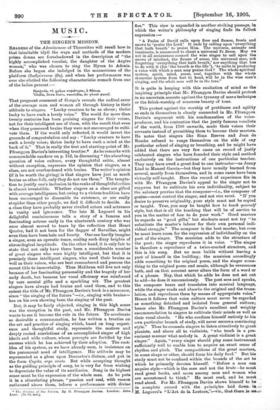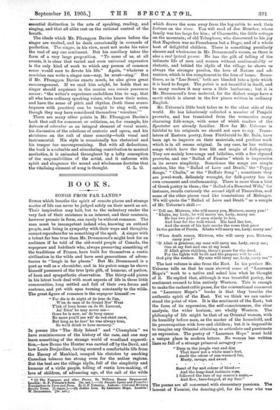MUSIC.
READERS of the Adoniazusae of Theocritus will recall how in that inimitable idyll the ways and methods of the modern prima donna are foreshadowed in the description of "the highly accomplished vocalist, the daughter of the Argive woman," who was chosen to sing the Hymn to Adonis. Before she began she indulged in the mannerisms of the platform (acapinrrerat and and when her performance was over she elicited the following characteristio remark from one of the ladies present :—
ripatwda, Ts. xpfoia wo4nkrepow, a 04.eta. '01.01n, licrea Moan, aavoX$la, Z.Is "Awl, oiuret
That pregnant comment of Gorgo's reveals the radical error of the average man and woman all through history in their attitude to singers. "Lucky creature to be so clever; thrice lucky to have such a lovely voice." The world for more than twenty centuries has been praising singers for their voices, not for their intelligent use of them, with the result that even when they possessed brains they were not encouraged to culti- vate them.. If the world only reflected, it would invert the grounds of congratulation and say : "Lucky creature to have such a lovely voice; thrice lucky to have such a mind at the back of it." That is really the text and starting-point of Mr. Ffrangcon Davies's interesting treatise.* As he remarks with commendable candour on p. 152, in discussing " the absorbing
question of voice culture, every thoughtful critic, almost without exception, expresses the opinion that singers, as a class, are not overburdened with brains. The writer's opinion (if it be worth the giving) is that singers have just as much brains as other folk, only they do not use them." The tempta- tion to justify one's inclusion in the ranks of thoughtful critics is almost irresistible. Whether singers as a class are gifted with average intelligence, but owing to a vicious tradition have been encouraged to dissemble its existence, or are really stupider than other people, we find it difficult to decide. As a class they have probably never rivalled actors and actresses in vanity and ignorance. The late M. Legouve in his delightful reminiscences tells a story of a famous and fascinating actress early in the nineteenth century who was once almost moved to tears by the reflection that Henri Quake, had it not been for the dagger of Reveille°, might even then have been hale and hearty. One can hardly imagine a singer, even an operatic tenor, scaling such dizzy heights of chronological ineptitude. On the other hand, it is only fair to state that not only have there been a considerable number of great singers who were highly intelligent, but that it is precisely these intelligent singers, who used their brains as well as their voices, who are best remembered and possess the surest title to immortality. Thus Malibran will live not only because of her fascinating personality and the tragedy of her early death, but because her vocal efficiency was reinforced by rare mental gifts and a sparkling wit. The greatest singers have always had brains and used them, and to this extent the title of Mr. Ffrangcon Davies's book is a misnomer, since " the singing of the future "—i.e., singing with brains— has on his own showing been the singing of the past.
But, it may be fairly objected, singing in this high sense was the exception in the past, and Mr. Ffrangcon Davies wants to see it become the rule in the future. To accelerate so desirable a consummation, he has written a treatise on the art and practice of singing which, based on long experi- ence and thoughtful study, represents the mature and deeply rooted convictions of an accomplished singer of high ideals and wide culture, whose precepts are fortified by the success which he has achieved by their adoption. The root- idea of his system, as we have already seen, is insistence on the paramount need of intelligence. His attitude may be represented as a gloss upon Descartes's dictum, and put in the form Cogito, ergo canto. But while accepting thought as the guiding principle of song, be is very far from wishing to depreciate the value of its auxiliaries. Song in its highest sense must be the expression of the whole man. As he puts it in a stimulating phrase, " passion and zeal, with reason enthroned above them, inform a performance with divine • The Singing of the Future. By D. Flrnng.on Davies. London : John Lane. [7s. 61. wt.}
fire." This view is expanded in another striking passage, in which the writer's philosophy of singing finds its fullest expression :—
"A Psalm of David calls upon fires and flames, frosts and snows to 'praise the Lord.' It ends by calling upon everything that hath breath' to praise Him. The universe, animate and inanimate, is summoned to chant a universal T'e Deln. May we not in all seriousness counsel the wise singer to call upon the snows of intellect, the flames of sense, the universal man, not forgetting everything that hath breath,' nor anything that has to do with it (for 'the breath is the life '), 'to unite in producing a voice with which a man may praise God P The whole spiritual system, spirit, mind, sense, soul, together with the whole muscular system from feet to head, will be in the wise man's singing, and the whole man will be in the tone."
It is quite in keeping with this exaltation of mind as the inspiring principle that Mr. Ffrangcon Davies should protest in no uncertain accents against the tyranny of mere technique or the fetish-worship of sensuous beauty of tone.
This protest against the worship of prettiness and agility as ends in themselves is closely connected in Mr. Ffranggon Davies's argument with his condemnation of the voice- producer, and his contention that the justly famous vocalists of the world, from 1700 onwards, made their voices their servants instead of permitting them to become their masters.
He notes that singers like Sims Reeves and Jean de Reszke refused to range themselves on the side of any particular school of singing or breathing, and he might have added that there are very few cases on record of justly celebrated singers who have founded their style and method exclusively on the instructions of one particular teacher. They may have owed a great deal to one instructor—as Jenny Lind to Manuel Garcia—but they have usually learned from several, mostly from themselves, and in some cases have been virtually self-taught. Here the record of experience fits in with Mr. Ffrangcon Davies's appeal to the singer not to suppress but to cultivate his own individuality, subject to the salutary proviso that the composer—i.e., the composer of
genius—must control the singer, and not vice versa. "Ilyou. desire to preserve originality, your style must not be copied or taught. True, you may be taught how to teach yourself style, but that is all the teaching that will be of service to you in the matter of how to do your work." Good masters
he regards as "good gifts," but students must not try " to substitute the master's labour for their own personal indi- vidual struggle." The composer is the best master, but even he must leave room for the expression of individuality on the part of the singer. The musician adds to the structure of the poet ; the singer reproduces it in voice. " The singer is therefore a reproducer of a twice-erected structure, and this is his song. But no man builds without leaving a part of himself in the building ; the musician accordingly adds something to the original poem, and the singer some-
thing to the original poem and music, although he reverences both, and on that account never alters the form of a word or of a phrase. Nay, that which he adds he does not set out to add—he does it unconsciously. The poet sees and speaks,
the composer bears and translates into musical language, while the singer reads and absorbs the original and the trans- lation, and reproduces them by means of appropriate voice." Hence it follows that voice culture must never be regarded as something detached and isolated from general culture; hence also Mr. Ffranggon Davies's excellent and weighty recommendation to singers to cultivate their minds as well as their vocal chords. "He who confines himself entirely to his own particular branch of study, will never secure a convincing style." Thus he counsels singers to listen attentively to great pianists, and above all to violinists, "who teach in a pre- eminent manner what melody in A great violinist is a great singer." Again, " every singer should play some instrument sufficiently well to enable him to acquire an exact sense of rhythm and pitch. The compositions of the great masters, in some shape or other, should form his daily food." But his study must not be confined within the bounds of the art to which he primarily devotes himself. " Before a man can
acquire style—which is the man and not the brute—he must read great books, and move among men and women who are accustomed to think." He must read, and he must read aloud. For Mr. Ffrangcon Davies shows himself to be in complete accord with the principles laid down • in 0- Lagouve's "L'.Art de la Lecture,".:—viz., that there. is t
essential distinction in the arts of speaking, reading, and singing, and that all alike rest'on the rational control of the breath.
The ideals which Mr. Visage= Davies places before the singer are exalted, and he deals occasionally in counsels of perfection. The singer, in his view, must not make his voice' the tool of any one sentiment. But his corollary takes the form of a very large proposition. To some of us, at all events, it is clear that varied and even universal expression is the only kind of work to which any person of common sense would care to devote his life." Again, "whatever a musician can write a singer can—nay, he must—sing." But if Mr. Ffrangcon, Davies exacts much, he also gives great encouragement. If we read him aright, he holds that no singer should acquiesce in the maxim non amnia possum= °runes: "the writer's experience emboldens him to say, that all who have ordinary speaking voices, who know their notes, and have the sense of pitch and rhythm (both these senses improve with practice) can be taught to sing well, even though they may have considered themselves ` voiceless.' " There are many other points in Mr. Ffrangeon Davies's book that call for comment or criticism, as, for example, his defence of color•atur as an integral element of vocal music, his discussion of the relations of oratorio and opera, and his strictures on the cult of sheer sonority—both vocal and instrumental. His style is occasionally too rhetorical and his temper too uncompromising. But with all deductions, the book is a valuable and stimulating contribution to musical aesthetics, it is animated throughout by a lofty conception of the responsibilities of the artist, and it enforces with spirit and eloquence the sound and wholesome doctrine that the vitalising element of song is thought. C. L. G.











































 Previous page
Previous page